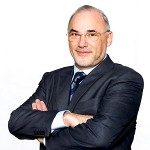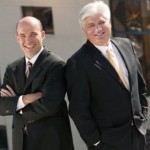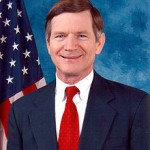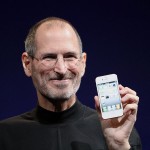Anthropic says its AI will not be used to spy on customers, even in government contracts. Here is what that means for AI governance, enterprise trust and defence partnerships.
Hi-tech personalities: the winners and losers of 2011

We’ve reached the end of 2011 – and it’s time to look back on the winners and losers of the year. Those who made our gadget life more awesome, and those that ruined it for everyone. Those that rock, and those that suck. So, without further ado, Gearburn’s Geared and Burned personalities of 2011.
Burned
Leo Apotheker of HP
 He was bounced out of HP in disgrace, consoled only by the $25-million payout he trousered for less than a year’s work (a healthy wedge of the US$84-million HP has paid to revolving door chief execs in the past six years), but not before he’d kicked a massive hole in HP’s PC business pipeline by announcing that HP would follow IBM’s lead and get out of making personal computers. He also over-paid for a software business acquisition (Autonomy), and spent a fortune buying Palm, launching the TouchPad tablet, then killing the lot – costing HP US$3.3-billion. Thank goodness Meg Whitman restored sanity.
He was bounced out of HP in disgrace, consoled only by the $25-million payout he trousered for less than a year’s work (a healthy wedge of the US$84-million HP has paid to revolving door chief execs in the past six years), but not before he’d kicked a massive hole in HP’s PC business pipeline by announcing that HP would follow IBM’s lead and get out of making personal computers. He also over-paid for a software business acquisition (Autonomy), and spent a fortune buying Palm, launching the TouchPad tablet, then killing the lot – costing HP US$3.3-billion. Thank goodness Meg Whitman restored sanity.
Jim Balsillie and Mike Lazaridis of RIM
 Jim Balsillie and Mike Lazaridis take top Burn honours for systematically crushing the spirit of RIM, missing opportunity after opportunity, and presiding over the collapse of market share, brand reputation and stock price – but mostly of failing to break open the reality bubble they’ve created around them. Half a year ago a RIM engineer penned a passionately heartfelt letter to the tag-team CEOs about the culture of tin-eared yes-men in upper management. Back then the letter was pooh-poohed by RIM, now it’s the Gospel According to Harsh Reality. Investors and analysts want them out, as the company has become the living embodiment of Dilbert’s workplace.
Jim Balsillie and Mike Lazaridis take top Burn honours for systematically crushing the spirit of RIM, missing opportunity after opportunity, and presiding over the collapse of market share, brand reputation and stock price – but mostly of failing to break open the reality bubble they’ve created around them. Half a year ago a RIM engineer penned a passionately heartfelt letter to the tag-team CEOs about the culture of tin-eared yes-men in upper management. Back then the letter was pooh-poohed by RIM, now it’s the Gospel According to Harsh Reality. Investors and analysts want them out, as the company has become the living embodiment of Dilbert’s workplace.
Lamar Smith — politician extraordinaire, not
 Lamar Smith is the internet’s least favourite person. The reactionary Luddite from Texas is the Republican congressman that sponsored the Stop Online Piracy Act (SOPA), a terrible piece of legislation that caves in to the demands of the film, music and entertainment lobby, while ignoring the rights of consumers, ignoring the technical implications of messing with DNS, and putting internet companies into an invidious position with regard to having to police content. “I’m not a technical expert on this,” he said during the main debate: “I’m trying to ferret this out.” How about trying to understand stuff before you break it, loser.
Lamar Smith is the internet’s least favourite person. The reactionary Luddite from Texas is the Republican congressman that sponsored the Stop Online Piracy Act (SOPA), a terrible piece of legislation that caves in to the demands of the film, music and entertainment lobby, while ignoring the rights of consumers, ignoring the technical implications of messing with DNS, and putting internet companies into an invidious position with regard to having to police content. “I’m not a technical expert on this,” he said during the main debate: “I’m trying to ferret this out.” How about trying to understand stuff before you break it, loser.
Steve Jobs of Apple
 Steve Jobs, the biggest loser of them all – losing the incredibly unfair battle to a rare form of pancreatic cancer. Jobs fought the ravaging cells running amuck in his body since 2004, with a series of complex medical treatments, including a liver transplant. He kept working for most of this time, leading Apple to ever greater heights of market and product success. His untimely death in October 2011 has not yet created a crisis at Apple, for Jobs built a powerful executive team around him, but as a monomanic micro-manager with a hand in almost every major development at the company, reports are starting to surface of groups becoming rudderless in the Jobsian vacuum. Steve Jobs, 24 Feb 1955-Oct 5 2011, RIP.
Steve Jobs, the biggest loser of them all – losing the incredibly unfair battle to a rare form of pancreatic cancer. Jobs fought the ravaging cells running amuck in his body since 2004, with a series of complex medical treatments, including a liver transplant. He kept working for most of this time, leading Apple to ever greater heights of market and product success. His untimely death in October 2011 has not yet created a crisis at Apple, for Jobs built a powerful executive team around him, but as a monomanic micro-manager with a hand in almost every major development at the company, reports are starting to surface of groups becoming rudderless in the Jobsian vacuum. Steve Jobs, 24 Feb 1955-Oct 5 2011, RIP.
Geared
JK Shin of Samsung Mobile
 JK Shin is head of Samsung Mobile Communications, and the man who has taken the manufacturer from just one of the mobi mob to the 800-pound gorilla it is now. Samsung expects to sell 300-million units this year. Who would have thought a couple of years ago that the mighty Nokia would be eclipsed by the creator of a billion microwave ovens and washing machines? JK Shin has the vision (multi-OS strategy and highly-funded hardware R&D) and aggression (giving Apple as good as it gets in the ongoing handbag fight) to win in this crazy competitive market. Galaxy S II, Galaxy Tab, thank this man.
JK Shin is head of Samsung Mobile Communications, and the man who has taken the manufacturer from just one of the mobi mob to the 800-pound gorilla it is now. Samsung expects to sell 300-million units this year. Who would have thought a couple of years ago that the mighty Nokia would be eclipsed by the creator of a billion microwave ovens and washing machines? JK Shin has the vision (multi-OS strategy and highly-funded hardware R&D) and aggression (giving Apple as good as it gets in the ongoing handbag fight) to win in this crazy competitive market. Galaxy S II, Galaxy Tab, thank this man.Andy Lees of Microsoft
 Andy Lees, a Brit that’s now risen high in the Microsoft pantheon, has just been tasked with driving adoption of Windows 8 and Windows Phone. He was the Windows Phone man, turning around Microsoft’s unloved Windows Mobile into the strange looking but decidedly innovative Windows Phone platform. Lees’ Leviathan task is to keep the Windows 8, Windows Phone and Windows Tablet teams pulling in the same direction. Succeed, and Microsoft’s consumer business succeeds. Fail, and it’s back to hawking SharePoint to ponderous corporate customers.
Andy Lees, a Brit that’s now risen high in the Microsoft pantheon, has just been tasked with driving adoption of Windows 8 and Windows Phone. He was the Windows Phone man, turning around Microsoft’s unloved Windows Mobile into the strange looking but decidedly innovative Windows Phone platform. Lees’ Leviathan task is to keep the Windows 8, Windows Phone and Windows Tablet teams pulling in the same direction. Succeed, and Microsoft’s consumer business succeeds. Fail, and it’s back to hawking SharePoint to ponderous corporate customers.
Meg Whitman of HP
 Meg Whitman may have blown US$144 million of her own money chasing the governorship of California on a Republican ticket, but she returned to favour with the geek crowd by first reversing Leo Apotheker’s decision for HP to get out the PC business, and then by open sourcing WebOS, hopefully in a bid to build a foundation for a reboot of HP’s tablet aspirations in a few years.
Meg Whitman may have blown US$144 million of her own money chasing the governorship of California on a Republican ticket, but she returned to favour with the geek crowd by first reversing Leo Apotheker’s decision for HP to get out the PC business, and then by open sourcing WebOS, hopefully in a bid to build a foundation for a reboot of HP’s tablet aspirations in a few years.
Robert Bowling of Infinity Ward
 Robert “fourzerotwo” Bowling is the Creative Strategist of Infinity Ward, creator of the worlds most successful entertainment property – Call of Duty: Modern Warfare. Stop! Stop! Step back from the keyboard – yes, we know he didn’t create the game itself – there was a huge team of people, not the least of which are the two founders Vince Zampella and Grant Collier, ousted by Activision in an acrimonious public firing (with legal action going to court right now). Bowling, however, is the man that has through his substantial PR and corporate politicking talents helped take Modern Warfare 3 to US$1-billion in revenues, the single biggest entertainment product ever.
Robert “fourzerotwo” Bowling is the Creative Strategist of Infinity Ward, creator of the worlds most successful entertainment property – Call of Duty: Modern Warfare. Stop! Stop! Step back from the keyboard – yes, we know he didn’t create the game itself – there was a huge team of people, not the least of which are the two founders Vince Zampella and Grant Collier, ousted by Activision in an acrimonious public firing (with legal action going to court right now). Bowling, however, is the man that has through his substantial PR and corporate politicking talents helped take Modern Warfare 3 to US$1-billion in revenues, the single biggest entertainment product ever.
Honourable mention: HTC CEO Peter Chou
 Peter Chou was a huge loser in the eyes of modders for HTC’s policy of locking down the bootloader to stop people hacking their phones with custom ROMs. After a storm of protests, HTC relented, and Chou announced the policy reversed. Good on you.
Peter Chou was a huge loser in the eyes of modders for HTC’s policy of locking down the bootloader to stop people hacking their phones with custom ROMs. After a storm of protests, HTC relented, and Chou announced the policy reversed. Good on you.

